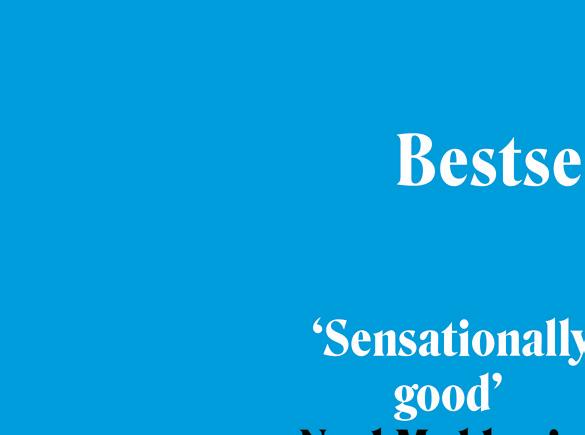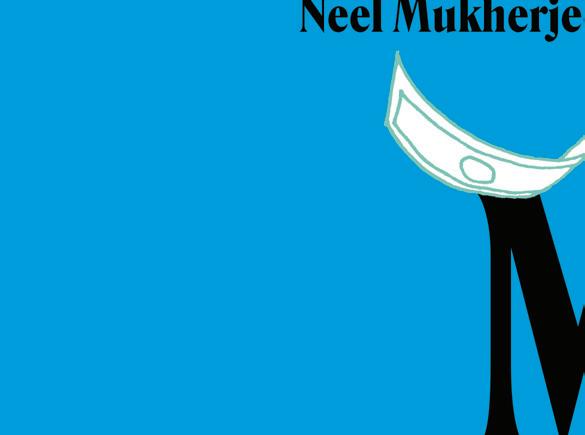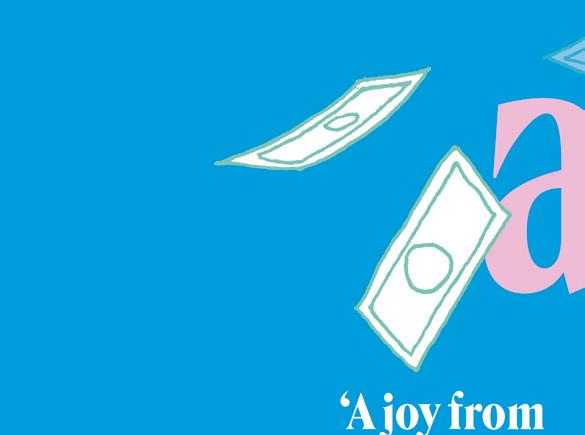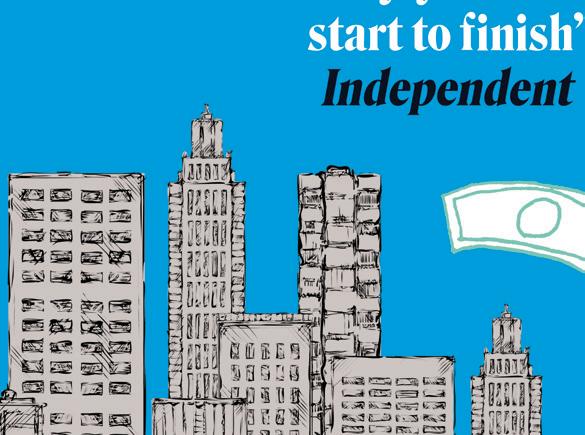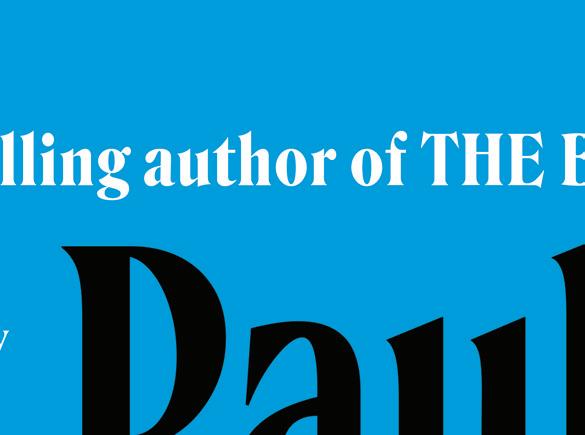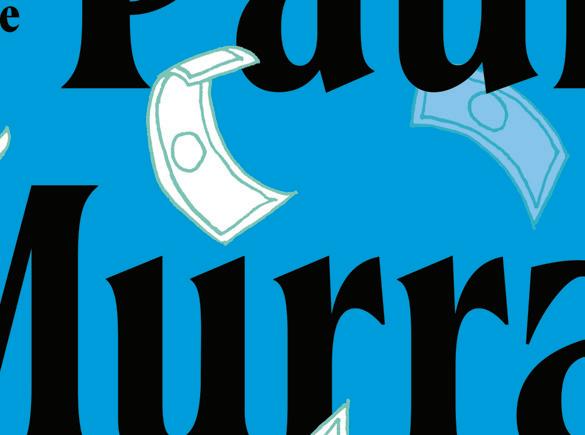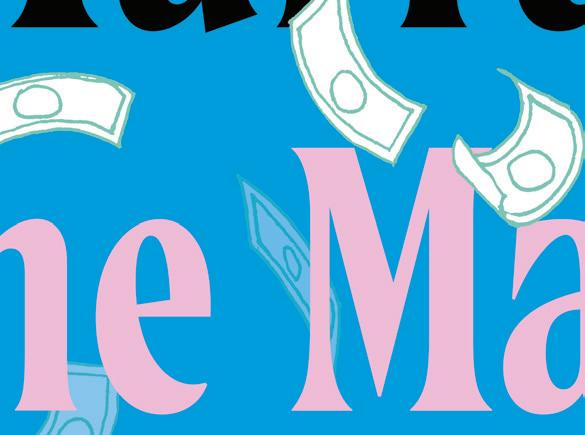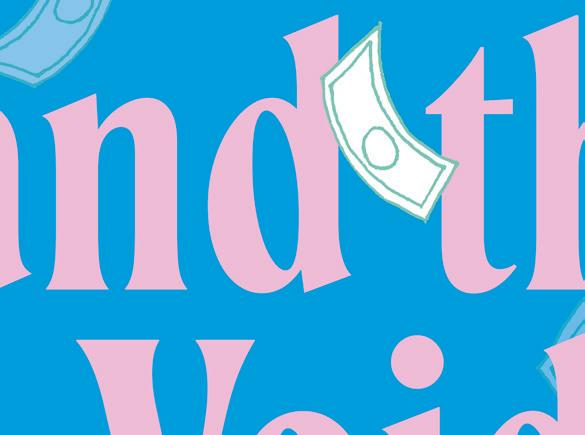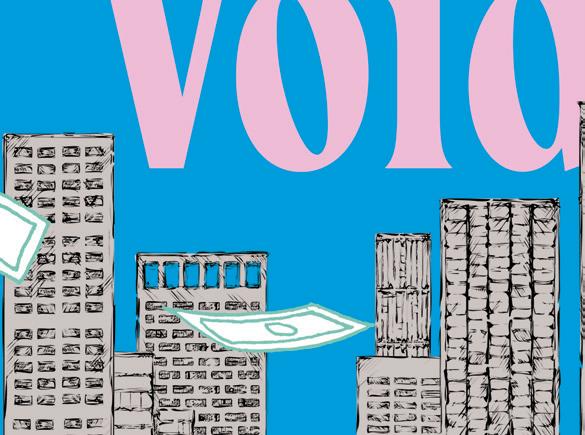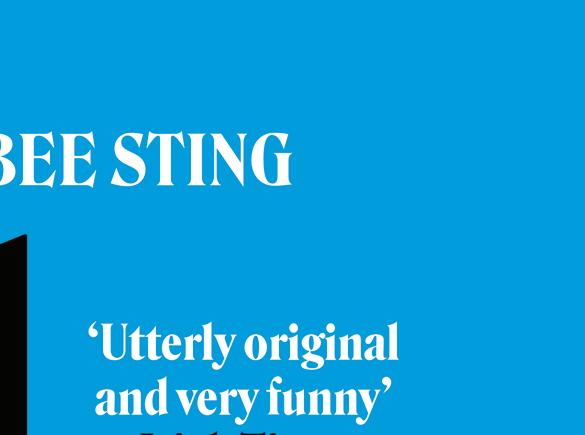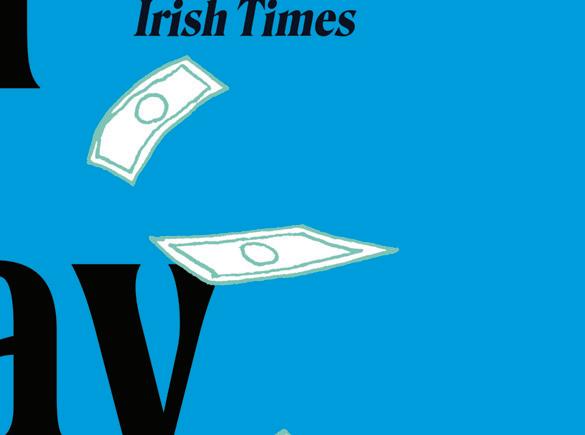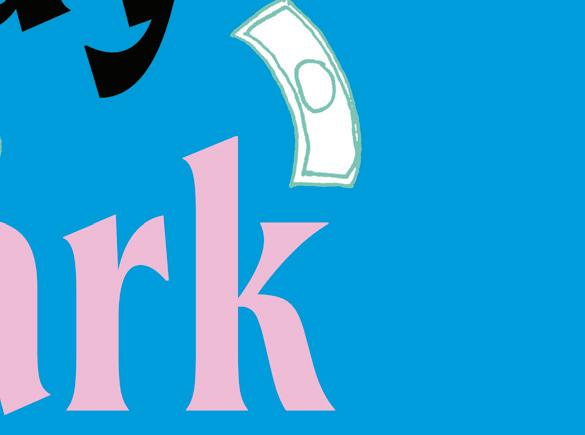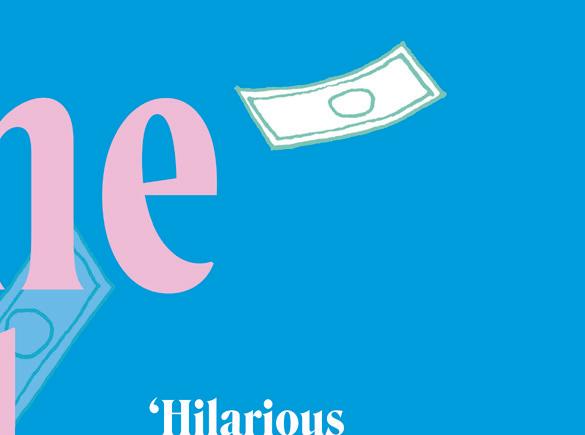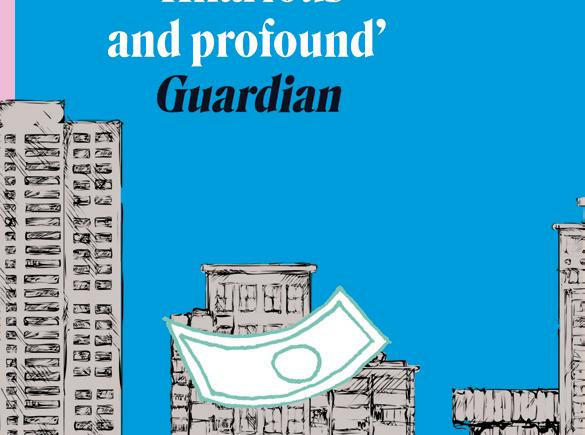A Boat Ride
As a remedy to life in society I would su est the big city. Nowadays, it is the only desert within our means.
Albert Camus
‘Claude?’
‘Yes?’
‘What are you doing under your desk?’
‘Me?’
‘You’re not hiding, are you?’
‘Why would I be hiding?’ I say. I wait a moment, hoping that this will satisfy her, but her feet remain where they are. ‘I am looking for my stapler,’ I add.
‘Oh,’ Ish says. On one ankle, between her patent-leather pumps and the hem of her skirt, I glimpse a slender chain from which several small animal charms dangle. Now a pair of brown brogues approaches over the fuzzy blue carpet tiles and comes to a halt beside Ish’s pumps.
‘What’s happening?’ I hear Jurgen say.
‘Claude’s looking for his stapler,’ Ish says.
‘Oh,’ says Jurgen, and then, ‘But here is his stapler, directly on the desk.’
‘So it is,’ Ish says. ‘Claude, your stapler’s right here on your desk!’
I clamber to my feet, and look down to where she is pointing. ‘Ah!’ I say, attempting to appear pleased and surprised.
‘Are you coming for lunch?’ Jurgen says. ‘We are going to the hippie place.’
‘I’m rather busy,’ I say.
‘It’s Casual Day!’ Ish exhorts me. ‘You can’t eat at your desk on Casual Day!’
‘I have a meeting with Walter this afternoon.’
‘Come on, Claude, you can’t live on Carambars.’ She grabs my arm and starts tugging me.
‘All right, all right,’ I say, reaching for my suit jacket, pretending not to notice the disapproving eye she casts over me as I put it on.
Ish studied anthropology back in Australia; Casual Day, one of the few rituals we have at Bank of Torabundo, is something she takes very seriously. For most of the sta a pair of well-pressed chinos and perhaps an undone top shirt-button will su ce, but Ish is wearing a low-cut top fringed with tassels, and a long, multicoloured skirt, also with tassels. She has even topped up her tan for the occasion, a deep greasy brown that makes it look like she has smeared her body with pâté. This image, when it occurs to me, immediately makes me nauseous, and as we descend in the lift my stomach dips and soars like a fairground ride. I dislike Casual Day at the best of times; today it spurs my paranoia to new and queasy heights.
‘Is Kevin coming?’ I say to distract myself.
‘He went on ahead to try and get a table,’ Ish says.
‘This whole place goes mental on Casual Day,’ Jurgen says.
At every oor the lift stops and we are joined by more people in pressed chinos with their top shirt-button undone, squeezing in beside us, sucking up the air. The crush makes my heart race: it’s a relief to step through the double doors of Transaction House and into the fresh air – but only for a moment.
Pastel waves of identically clad bodies are converging on the plaza from every direction. I scan the approaching faces, the bland gazes that beat against mine. Amid all the smart-casualwear a gure in black should be easy to spot – but that means I too am an obvious target, and in a freezing ash I can picture him making his way through the sea of bodies, a cancerous cell swimming in the innocent blood.
‘Thinking of getting a bidet,’ Ish says.
‘For the new apartment?’ Jurgen says.
‘Wasn’t something I’d thought of initially, but the bloke from the showroom called up and said because I’m going for the full suite they can throw in a bidet for half price. The question is, do I want a bidet? You know, at this stage I’ve got my toilet routine pretty much worked out.’
‘You do not want to feel like an alien in your own bathroom,’ Jurgen agrees. ‘I suppose Claude would be the expert. Claude, how much of a bene t do you think the addition of a bidet would be?’
‘Do you think French people do nothing else but eat baguettes and sit on their bidets?’ I snap. Out here I am nding it hard to hide my nerves.
Jurgen starts telling Ish about a special toilet he has had imported from Germany. I tune him out, return to my search. Above my head, monochrome birds wheel and swoop, like scraps torn from the overcast sky. How long has it been now? A week? Two? That’s since I rst became conscious of him, though when I think to before that, I seem to nd him there too, posed unobtrusively at the back of my memories.
There’s no discernible pattern to his appearances: he’ll be here one day, somewhere else the next. In the gloom of morning, I might see him by the tram tracks as I make the brief, synaptic journey from my apartment building to the bank; later, bent over a pitchbook with Jurgen, I’ll glance out the window and spot him seated on a bench, eating sun ower seeds from a packet. In the deli, in the bar – even at night, when I stand on my balcony and look out over the depopulated concourse – I will seem to glimpse him for an instant, his blank gaze the mirror image of my own.
The Ark is in sight now; inside, I can see the waitresses gliding back and forth, the customers eating, talking, toying with their phones. Of my pursuer there is no sign, yet with every step the dreadful certainty grows that he is in there. I stall, with a clammy mouth begin to mumble excuses, but too late, the door is opening and a gure coming straight for us –
‘Full,’ Kevin says.
‘Balls,’ Ish says.
‘They’re saying fteen minutes,’ Kevin says.
Jurgen looks at his watch. ‘That would give us only twelve and a half minutes to eat.’
‘Oh well,’ I say, with a false sigh. ‘I suppose we must go back to –’
‘What about that new place?’ Ish says, snapping her ngers. ‘Over on the other side of the square? You’ll like it, Claude, it’s French.’
I shrug. So long as we are moving in the opposite direction to the Ark, I am happy.
The ‘French place’ is called Chomps Elysées. An image of the Ei el Tower adorns the laminated sign, and on the walls inside are photographs of the Sacré-Cœur and the Moulin Rouge. Nothing about the menu seems especially Gallic; I order a moccachino and something called a ‘panini fromage’, and while Kevin the trainee o ers his thoughts on Ish’s lavatorial options, I sit back in my seat and try to relax. Be reasonable, I tell myself: who would be interested in following you? Nobody, is the answer. Nobody outside my department even knows I exist.
This thought doesn’t cheer me quite as I intend it to; and the panini fromage, when it comes, only makes matters worse. It is not that the cheese tastes bad exactly; rather, that it tastes of nothing. I don’t think I have ever tasted nothing quite so strongly before. It’s like eating a tiny black hole wrapped in an Italian sandwich. There is no way food this bad would ever be served in Paris, I think to myself, and experience a sudden stab of homesickness. How far I have come! How much I have left behind! And for what? Now with every chew I feel the emptiness rising inside, as if, like a kind of anti-madeleine, the panini were erasing my past before my very eyes – severing every tie, leaving me only this grey moment, tasting of nothing . . .
I approach the counter. The waitress’s scowl appears authentically Parisian, but her accent, when she speaks, denotes the more proactive hostility of the Slav.
‘Yes?’ she says, not pretending that my appearance has made her any less bored.
‘I think there has been a mistake,’ I say.
‘Panini fromage,’ she says. ‘Is French cheese.’
‘But it is not cheese,’ I say. ‘It’s arti cial.’
‘Arti cial?’
‘Not real.’ Prising apart the bread for her inspection, I point at the o -white slab sitting atop the melancholy lettuce. It resembles nothing so much as a blank piece of matter, featureless and opaque, before God’s brush has painted it with the colour and shape of speci city. ‘I am from France,’ I tell her, as if this might clarify matters. ‘And this is not French cheese.’
The girl looks at me with unconcealed contempt. You are not supposed to complain in restaurants like this one; you are not supposed to notice the food in restaurants like this one, any more than you notice the streets you hurry through, latte in hand, back to your computer. The screen, the phone, that disembodied world is the one we truly inhabit; the International Financial Services Centre is merely a frame for it, an outline, the equivalent of the chalk marks of a child’s game on the pavement.
‘You vant chench?’ the girl taunts me. I raise my hands in surrender and, cheeks burning, turn away.
Only then do I realize the man in black is standing right behind me.
Around us, the café has returned to normal life; the sullen girl rings up another panini, the o ce workers drink their uniquely tailored co ees. I goggle at Ish at the nearby table, but she doesn’t seem to notice – nor does anyone else, as if the stranger has cast some cloak of invisibility over us. Blinding white light pours through the open door; he gazes at me, his eyes a terrifying ice-blue.
‘Claude,’ he says. He knows my name, of course he does. ‘What do you want from me?’ I try to sound de ant, but my voice will not come in more than a whisper.
‘Just to talk,’ he says.
‘You have the wrong man,’ I say. ‘I have not done anything.’
‘That makes you the right man,’ he says. A smile spreads slowly across his chops. ‘That makes you exactly the right man.’
His name is Paul; he is a writer. ‘I’ve been shadowing you for a project I’m working on. I had no idea you’d spotted me. I hope I didn’t alarm you.’
‘I was not alarmed,’ I lie. ‘Although these days one must be careful. There are a lot of people very angry at bankers.’
‘Well, I can only apologize again. And lunch is de nitely on me – ah, here we go.’ The waitress appears, dark and genial as her counterpart in the fake French café was blonde and cold, and sets down two bowls of freshly made sorrel soup. We have crossed the plaza back to the Ark, and this time found a table.
‘I can see why you like this place,’ he says, dipping a hunk of bread into his soup. ‘The food’s fantastic. And I love all this nautical stu ,’ nodding at the portholes, the great anchor by the door. ‘It’s like going on a boat ride.’ He purses his lips and blows on the bread; he doesn’t appear to be in any great hurry to tell me why we are here.
‘So you are a writer,’ I say. ‘What kind of things do you write?’
‘A few years back I wrote a novel,’ he says, ‘called For Love of a Clown.’
This prompts a faint ringing at the back of my mind – some kind of prize . . . ?
‘You’re thinking of The Clowns of Sorrow by Bimal Banerjee, which won the Raytheon. My novel came out around the same time, similar enough subject matter. It did all right, but when the time came to begin the next one, I found I’d hit a kind of wall. Started asking myself some really hard questions – what’s the novel for, what place does it have in the modern world, all that. For a long time I was stuck, really and truly stuck. Then out of
nowhere it came to me. Idea for a new book, the whole thing right there, like a baby left on the doorstep.’
‘And what is it about?’ I ask politely.
‘What’s it about?’ Paul smiles. ‘Well, it’s about you, Claude. It’s about you.’
I am too surprised to conceal it. ‘Me?’
‘I’ve been studying you and your daily routine for a number of weeks now. It seems to me that your life embodies certain values, certain fundamental features of our modern world. We’re living in a time of great change, and a man like you is right at the coalface of that change.’
‘I do not think my life would make a very interesting book,’ I say. ‘I feel I can speak with a certain amount of authority here.’
He laughs. ‘Well, in a way that’s the point. The stories we read in books, what’s presented to us as being interesting – they have very little to do with real life as it’s lived today. I’m not talking about straight-up escapism, your vampires, serial killers, codes hidden in paintings, and so on. I mean so-called serious literature. A boy goes hunting with his emotionally volatile father, a bereaved woman befriends an asylum seeker, a composer with a rare neurological disorder walks around New York, thinking about the nature of art. People looking back over their lives, people having revelations, people discovering meaning. Meaning, that’s the big thing. The way these books have it, you trip over a rock you’ll nd some hidden meaning waiting there. Everyone’s constantly on the verge of some soul-shaking transformation. And it’s – if you’ll forgive my language – it’s bullshit. Modern people live in a state of distraction. They go from one distraction to the next, and that’s how they like it. They don’t transform, they don’t stop to smell the roses, they don’t sit around recollecting long passages of their childhood – Jesus, I can hardly remember what I was doing two days ago. My point is, people aren’t waiting to be restored to some ine able moment.
They’re not looking for meaning. That whole idea of the novel – that’s nished.’
‘So you want to write a book that has no meaning,’ I say.
‘I want to write a book that isn’t full of things that only ever happen in books,’ he says. ‘I want to write something that genuinely re ects how we live today. Real, actual life, not some ivory-tower palaver, not a whole load of literature. What’s it like to be alive in the twenty- rst century? Look at this place, for example.’ He sweeps an arm at the window, the glass anonymity of the International Financial Services Centre. ‘We’re in the middle of Dublin, where Joyce set Ulysses. But it doesn’t look like Dublin. We could be in London, or Frankfurt, or Kuala Lumpur. There are all these people, but nobody’s speaking to each other, everyone’s just looking at their phones. And that’s what this place is for. It’s a place for being somewhere else. Being here means not being here. And that’s modern life.’
‘I see,’ I say, although I don’t, quite.
‘So the question is, how do you describe it? If James Joyce was writing Ulysses today, if he was writing not about some nineteenth-century backwater but about the capital of the most globalized country in the world – where would he begin? Who would his Bloom be? His Everyman?’
He looks at me pointedly, but it takes me a moment to realize the import of his words.
‘You think I am an Everyman?’
He makes a hey presto gesture with his hands.
‘But I’m not even Irish,’ I protest. ‘How can I be your typical Dubliner?’
He shakes his head vigorously. ‘That’s key. Like I said, somewhere else is what this place is all about. Think about it, in your work, you have colleagues from all over the place, right?’
‘That’s true.’
‘And the cleaning sta are from all over the place, and the waitresses in this restaurant are from all over the place. Modern life
is a centrifuge; it throws people in every direction. That’s why you’re so perfect for this book. The Everyman’s uprooted, he’s alone, he’s separated from his friends and family. And the work that you do – you’re a banker, isn’t that so?’
‘Yes, an analyst at Bank of Torabundo,’ I say, before it occurs to me how strange it is that he knows this.
‘Well.’ He spreads his hands to signify self-evidence. ‘I hardly need to say how representative that is. The story of the twenty- rst century so far is the story of the banks. Look at the mess this country’s in because of them.’
Ah. I begin to understand. ‘So your book will be a kind of exposé.’
‘No, no, no,’ he says, waving his hands as if to dispel some evil-smelling smoke. ‘I don’t want to write a takedown. I’m not interested in demonizing an entire industry because of the actions of a minority. I want to get past the stereotypes, discover the humanity inside the corporate machine. I want to show what it’s like to be a modern man. And this is where he lives, not on a shing trawler, not in a coal mine, not on a ranch in Wyoming. This’ – he gestures once again at the window, and we both turn in our seats to contemplate the reticular expanse of the Centre, the blank façades of the multinationals –‘is where modern life comes from. The feel of it, the look of it. Everything. What happens inside those buildings de nes how we live our lives. Even if we only notice when it goes wrong. The banks are like the heart, the engine room, the world-within-the-world. The stu that comes out of these places,’ whirling a nger again at the Centre, ‘the credit, the deals, that’s what our reality is made of. So, with that in mind, can you think of a better subject for a book – than you?’
Essentially, he tells me, the process would be a more intensive version of what he has been doing already: following me around,
observing at close quarters, focusing, as much as is possible, on my work for the bank.
‘What would I have to do?’
‘You wouldn’t have to do anything,’ Paul says. ‘Just be yourself. Just be.’ He glances at the bill, takes a note from his wallet and lays it on the plate. ‘I don’t expect you to make a decision like this on the spot. To lay yourself out for a perfect stranger – that’s a big thing to ask. I wish I could say that you’d be handsomely rewarded, but right now all I can o er is the dubious honour of providing material for a book that might never get published.’ He cracks a grin. ‘Still, I bet the girls in the o ce’ll be interested to nd out you’re a character in a work of ction.’
‘How do you mean?’
‘Think about it – Heathcli , Mr Darcy. Captain Ahab, even. Women go nuts for them.’
‘Although those characters are imaginary,’ I say slowly.
‘Exactly. But you’ll be real. Do you see? It’s like you’ll be getting the best of both worlds.’
As if to bear out his words, the beautiful dark-haired waitress ashes me a smile as she glides past.
My head is spinning, and it really is time for me to get back to the o ce. But there is still one question he has not answered. ‘Why me? There are thirty thousand people working in the IFSC . Why did you choose me?’
‘To be honest, that’s what caught my eye initially,’ he says.
‘That? Oh.’ I realize he’s pointing at my jacket, which I am in the course of slipping back on.
‘The black really stands out, especially with the tie. Most people here seem to go for grey. Must be a French thing, is it?’
Yes, I say, it’s a French thing.
‘Makes you look very literary,’ he says. ‘And when I got closer I could see you had a certain . . . I don’t know, a sensibility. I got the impression that you were di erent from the others. That you
weren’t just going through the motions. That you were searching for something, maybe. It’s hard to explain.’ He rips a scrap of paper from a little red notebook and scribbles down his number. ‘Look,’ he says. ‘I could be completely wrong, but I think there’s a really important book to be written about this place. And I think you’d be perfect for it. If it doesn’t feel right to you, for whatever reason, I promise I’ll disappear from your life. But can I ask you at least to think about it?’
‘Here he is!’ Jurgen says as I enter the Research Department. ‘We were beginning to think we must send out the search party!’
‘Where d’you disappear to?’ Ish inquires, through a mouthful of paper clips.
‘Nowhere,’ I shrug. ‘I ran into someone and went for a co ee.’
‘Casual Day.’ Jurgen shakes his head. ‘Anything can happen.’ Kimberlee comes in from Reception. ‘Claude, Ryan Colchis called about some numbers on a Ukrainian out t you were digging up for him.’
‘Okay,’ I say.
‘And Walter’s PA called to say he’s coming in.’
‘There goes your weekend,’ Ish says.
I sit down at my terminal, confront the wall of fresh emails. Already the writer and his strange proposal are beginning to seem distant and unreal, one of those hazy episodes you can’t be sure you didn’t dream. And yet the familiar objects of the o ce have acquired a curious sheen – appear to resonate somehow, like enchanted furniture in a fairy tale that will dance around the room as soon as you turn your back.
‘Hey, has Claude heard the news?’ Kevin calls from his desk.
‘What news?’ I say, with a curious feeling of – what, synchronicity? As though someone is looking over my shoulder?
‘Blankly’s the new CEO,’ Ish says. ‘Rachael’s o ce just sent down word.’
‘Blankly got it,’ I say. ‘Well, well.’
‘Things will be changing, Claude,’ Jurgen says. ‘This is the whole new beginning of the Bank of Torabundo story.’
‘Yes,’ I say, and then, ‘I should call Colchis.’
‘Are you feeling better?’ Ish catches my arm. ‘You looked a bit o earlier.’
‘Yes, yes, I just needed some air,’ I tell her, but she is not deterred: she continues to scrutinize me.
‘Are you sure?’ she says. ‘You seem, I dunno, di erent somehow.’
‘Claude is never di erent,’ Jurgen says, clapping me on the shoulder. ‘Claude is always the same.’
‘Yeah . . .’ Ish wrinkles her nose thoughtfully; and I turn my eyes to the screen, as if I have a secret to keep.
The Pareto principle, also known as the 80–20 rule, is one of the rst things you learn in banking: for any given area of life, 80 per cent of the e ects come from 20 per cent of the causes. Thus 80 per cent of your pro ts come from 20 per cent of your clients, 80 per cent of your socializing is with 20 per cent of your friends, 80 per cent of the music you listen to is from 20 per cent of your library, etc. The idea is to minimize the ‘grey zone’ that devours your day, the 80 per cent of your reading, for instance, that yields only 20 per cent of your information.
Walter Corless is very much aware what side of the rule he’s on. He knows he is the wealthiest and most powerful man you have ever met, and as such he demands 100 per cent of your time and attention. A meeting with or even a call from Walter is like some supermassive planet materializing in your little patch of space – blocking the sun, overwhelming your gravitational eld, so that you can only watch as the entire structure of your world goes hurtling o to rearrange itself on his. He started o selling turf from the back of a atbed truck; thirty years later, he is chairman and CEO of one of the biggest construction companies in the British Isles. Even the worldwide slump hasn’t hurt him: while his peers put all their chips into housing, Dublex diversied into transport, logistics and, most pro tably, high-security developments – military compounds, forti cations, prisons – which, as unrest sweeps across Europe and Asia, constitute a rare growth area. That a company he named after his daughter now builds enhanced interrogation facilities in Belarus gives a good indication of the man’s attitudes to business and life in general.
(That daughter, Lexi, now runs a string of nursing homes known informally as the Glue Factory.)
His driver calls me shortly after six; I go outside to nd Walter’s limo parked – in contravention of all of the Centre’s rules – on the plaza in front of Transaction House. Walter is sprawled across the back seat. He stares at me as I squeeze into the fold-down seat opposite him, breathing heavily through his nose. He is a dour, grey-faced man, who looks like he was dug up from the same bog he got his rst bags of turf. Newspaper proles refer to his ‘drive’ and his ‘focus’, but these are euphemisms. What Walter has is the dead-eyed relentlessness of the killer in a horror movie, the kind that lumber after you inexorably, heedless of knives, bullets, ame-throwers. Though his fortune runs into the billions, and he employs a team of accountants in tax havens around the world, he still enjoys calling on his debtors personally, and the pockets of his coat are always full of cheques, bank drafts, rolls of notes in rubber bands. Sometimes he’ll present me with a stful, with instructions to invest them in this or that. This is not strictly my job, but then Walter doesn’t care what my job is; or rather, as our biggest client, he knows that my job is whatever he says it is.
Tonight he wants to ask my thoughts on a tender. Dublex has been approached by the interior ministry of the Middle Eastern autocracy of Oran to fortify the private compound of the Caliph.
‘They are expecting trouble?’ I ask.
Walter just grunts. He knows, of course; he has specialists in every conceivable eld, but he still likes to canvass opinions from as wide a spectrum as possible before making a decision, in order, Ish says, to maximize the number of people he can yell at if something goes wrong. ‘Is there money in this fucker’s pocket, is what I’m asking you,’ he says.
‘It’s one of the biggest oil producers in the region. I imagine his credit is good,’ I say.
Walter scowls. I tell him I’ll look into it, and he signals his approval by changing the subject, launching into a familiar tirade about ‘regulations’.
When we are done, I return to my apartment, where I can nally start investigating the mysterious writer in earnest. Searching online, I discover that the novel he mentioned, For Love of a Clown, is real; an image search con rms, in a picture that shows him shaking hands with a giant papaya at something called the Donard Exotic Fruits and Book Festival, that its author and the man who approached me are one and the same. His Apeiron page has two customer write-ups, both negative: the rst compares his clown-themed novel unfavourably to Bimal Banerjee’s The Clowns of Sorrow, and gives it a rating of two snakes and a cactus; the second o ers no rating at all, and consists solely of the line ‘On no account should you lend money to this man.’ Beyond that, there is nothing. As far as the wider world is concerned, for the last seven years he might as well not have existed – which is consistent with what he told me about hitting a wall.
I go on to my balcony, try to look out with the eyes of a novelist. My apartment is in the International Financial Services Centre, a stone’s throw from the bank. The city centre lies upriver; if I lean over the rail, I can glimpse the Spire, jutting into the darkness like a radio transmitter from the heart of things, but it’s only on rare evenings, when the wind is blowing in a particular direction, that I hear its broadcasts – the whoops, the screams, the laughter and ghts – and even then only faintly, like the revelry of ghosts. Usually, when night has fallen and only a few lights remain, chequering the dark slabs of the buildings, it is easy, looking over the deserted concourse, to believe the world has upped stakes and gone, followed the baton of trade west, leaving me here alone.
Before I came here I knew little about Dublin. I had an idea it was famous for its dead writers; I remembered the name of the river from arguments in school over whether it’s Li ey or Lethe
the singer oats down in ‘How to Disappear Completely’. I entertained vague notions about Guinness and authenticity. It turned out to be very di erent from what I expected. At university, I had read about the virtual, the simulated world that abuts and interpenetrates our own – ‘real without being actual, present without being there’, in the words of the philosopher François Texier. I didn’t think, after graduating, that I would require the concept again; I certainly never dreamed I’d nd myself living in it.
That said, there is some argument as to whether the International Financial Services Centre is truly part of Dublin. It lies only a few minutes’ walk from O’Connell Street, but the locals don’t come here; many of them don’t even seem to know it exists, in spite of the torrents of capital that ow into it every year. It was built twenty years ago as a kind of pacemaker, an ingenious piece of nancial and legal technology embedded in Dublin’s thousand-year-old body. A jumble of stumpy glass buildings, it stretches along the river like a pygmy Manhattan, on what used to be docklands. Its main function is to be a kind of legal elsewhere: multinationals send their pro ts here to avoid tax, banks conduct their more sensitive activities with the guarantee of a blind eye from the authorities. Many of the companies here have billions in assets but no employees; the foyer of Transaction House is crowded with brass nameplates, all leading to a single, permanently empty, o ce. They call this shadow-banking, and the IFSC is a shadow-place – an alibi that will say you are here when you are not, and cover your presence when you don’t want to be seen.
Could you really set a book in such a place? In a city that is not a city? Filled with people who are paid not to be themselves? He says he wants to nd the humanity inside the machine, to track down the particular amid the golden abstractions; he says he can see something di erent about me, and standing on the balcony I thrill at the thought that I might see it too. But what
if he’s wrong? What if he holds up the mirror, and nothing is there?
Jurgen shares none of my reservations. ‘An author?’ he exclaims, when I mention it casually after the Monday meeting. ‘A real-life author? And he wants to put you in his book?’
‘Yes,’ I say.
‘You?’ Kevin the trainee says.
I shrug. ‘It seems that I just . . . t the bill, is that the phrase?’ (In fact I know perfectly well it is the phrase.)
‘Do you think he’ll put us in it as well?’
‘I don’t know,’ I say. ‘I will ask him.’
‘Doesn’t it sound a bit weird?’ Ish is more circumspect. ‘Some bloke following you around, writing down everything you do?’
‘What’s weird is that it hasn’t happened before,’ Kevin says. ‘When you think about it, there ought to be a lot more novelists wanting to write books about banks.’
‘But he’s not planning to slag us o , is he?’ Ish says. ‘You know, say we’re all wankers and fat cats and so on.’
‘He told me it was going to be a balanced account of life in a modern investment bank,’ I tell her. ‘He said he wanted to nd our hidden humanity.’
‘It is about time bankers were recognized by the art world,’ Jurgen says. ‘Given that we buy most of the actual art, it is frustrating to be continually misrepresented by it.’
‘So are you going to do it?’ Ish asks.
‘I haven’t decided,’ I say.
‘You have to do it!’ Kevin expostulates. ‘Tell him I’ll do it if you don’t want to.’
‘As your superior, I think you should do it, Claude,’ Jurgen agrees. ‘Though of course the nal decision remains with you.’
He adds that, while I am making up my mind, he will ‘get the ball rolling’ by running it by the Chief Operating O cer; before
I can protest, he has trundled away. Maybe Rachael will say no; I decide to put it out of my mind until I hear back.
I return to my desk, feel the familiar thrill in my viscera as I sit down in front of the terminal. Here is the market: the whole world represented in gures, a tesseract of pure information. The media like to portray bankers as motivated purely by greed, but this is not quite accurate. There are those who do it for the money, it’s true – who like miners or deep-sea divers bury themselves miles below the surface of things, far from the light and everything they love, in order to return laden down with riches. But there are others who do it for the god’s-eye view; those for whom the map has become the territory, for whom the market’s operations as represented on the screen appear more complex than life itself, deeper and more intricate, bringing their own vertiginous intelligence to the brute facts of the world in the same way that a painting of a landscape magni es its beauty by placing in a frame of consciousness the thoughtless doings of nature. For these latter sort, the highs of the best drugs are shadows next to the exhilaration they get from the shifting elds of numbers: rice growers in Henan, car manufacturers in Düsseldorf, pharmaceutical research rms in Cork and Montevideo, condensed, compressed, interacting with each other in ways of which they themselves have no conception, like molecules hurtling and dancing and colliding under a microscope.
Ish is an anomaly – not of the god’s-eye-view sort, but not especially interested in money either, other than what she needs to pay for her apartment, which she bought o the plans during the boom at a price she now admits may have been extravagant even for an investment banker.
‘Any word from the Uncanny Valley?’ she asks me now.
‘You are sitting here beside me, you know there is no word.’
‘Oh, right.’ A moment later she pipes up again. ‘Hey, Claude?’
‘If this is again a question about the book, the answer is “I don’t know.” ’
‘It’s not about the book, it’s about the movie of the book.’
‘. . .’
‘Well, if they make a lm of it, will I get a say in who plays me? I mean, I don’t want them to pick some old boot?’
The morning drags on with no response from Rachael. Shortly before noon, however, a shadow looms up behind me.
‘Crazy Frog, what the cock are you telling custies about Tarmalat?’
‘I am telling them that Tarmalat is carrying heavy exposure to Greek sovereign debt,’ I reply, ‘and there’s no way they’re going to hit their target.’
‘I’m trying to sell them Tarmalat, you fucking dunce!’ The muscles in his neck, which are extensive, bunch out like the mast lines of a ship at full sail. ‘I’ve got two hundred of the cunts going at twelve and a quarter.’
‘My source says their income’s down nearly 30 per cent on this same period last year. A write-down of Greek debt can cost them a hundred million. Your customers will thank you for sparing them.’
‘That’s not going to get us commission, is it?’ He scowls. ‘Fucking Greek pricks,’ he mutters. ‘Why couldn’t they stick to . . . what is it Greeks are good at again?’
‘Um, inventing democracy?’ Ish suggests.
‘They’ve been dining out on that one for a long time,’ Howie retorts.
Howie Hogan does not look like a genius. Twenty- ve, and hitting the gym hard every day, he still has a childish doughiness to his features, giving him the appearance of one of those overfed, unimaginative rich boys who see the world as a kind of third-rate in- ight movie, to which they will pay attention only until they reach their real destination. This is, in fact, exactly what he is. But he is also BOT ’s star trader. Beside mathematical acuity, sharp re exes, and an ability to get people to buy things they don’t want, Howie is gifted with almost total emotional
dissociation. Other traders freak out, crack up, crash and burn; Howie’s only reaction, win or lose, is to smirk. I am fairly sure he smirks in his sleep. What is he doing here? He should be in London, at one of the bulge brackets, making ten times what he does at BOT ; but some indiscretion in his past – details of which none of us has ever been able to establish – means he must get to the top the hard way.
Having chastised me for undermining sell-side, he would normally have lumbered o by now; instead he’s still hovering. ‘What’s this fucking bullshit I’m hearing?’ he says at last.
‘Close & Coulthard’s merger has been held up by the CMA ,’ I say. ‘I IM ’d you.’
‘No, about someone writing your autobiography.’
‘Oh, that.’
The smirk ickers. ‘Who the fuck would want to write a book about you?’ Howie says.
‘An author,’ I say expressionlessly.
‘For your information, he thinks Claude would make the perfect Everyman,’ Ish pitches in.
Howie laughs. ‘Everyman!’ he repeats. ‘Who’s that, the world’s most boring superhero?’
‘Isn’t there a harassment hearing you need to be at?’ Ish says.
‘Look out, supervillains! Everyman’s super-spreadsheet has the power to bore you to death!’ Howie struts away, still cackling. ‘Claude in a book! Who said the French have no sense of humour?’
‘Don’t mind him, Claude, he’s just jealous,’ Ish says.
‘Do people say the French have no sense of humour?’ I ask her.
‘Of course not,’ she says, patting my hand.
I return to my work, but this brief conversation has been enough to reawaken my fears. Howie is right. I don’t have a story; I don’t have time to have a story; I have organized my life here precisely in order not to have a story. Why would I want someone following me around, weighing me up, nding me lacking? I take
out my wallet, unfurl the scrap of paper on which Paul scrawled his number, but before I can call him and pass on my regrets, Jurgen approaches from the direction of the meeting rooms.
‘Claude! Good news!’ He grins at me with excitement. ‘Rachael has given the okay for your book project.’
‘Oh,’ I say, surprised.
‘You must call your author right away!’ he exhorts me.
‘I will,’ I say.
‘Right away,’ he repeats.
‘Yes,’ I say.
He stands there, waiting. Without even wanting to, I see him as an outsider might: take in his pocket protector, his hideous tie, his strange plasticated hair that never seems to grow any longer. Is he happy? Lonely? Bored? Do any of these terms even apply?
‘First I have a small errand to do,’ I say. I go to the lift and hit the button for the ground oor. As I descend, I turn the decision over in my mind. He’s not writing a book about me, I remind myself. He’s shadowing me for research purposes. I am a highly successful employee at a highly successful bank. There is no reason to fear that he will nd my life boring or empty.
The lift doors open. The security guards glance over, then away again almost immediately. Outside, the air is perfectly still. Workers clip back and forth in the windows of the buildings around me, a silent image of productivity. Yet across the river, the grey shell of Royal Irish Bank is populated only by seagulls, and just last week a German bank two oors below us imploded; we watched from above as the erstwhile employees led out through the double doors – blinking in the light, clinging to cardboard boxes full of mouse mats and cuses, casting up their eyes at the bright opaque windows as if to a land that was lost to them . . .
Paul answers on the second ring.
‘It’s me,’ I say. ‘Claude.’
There is a curious echo to the line, as if someone is listening in, and I have the strangest sense he already knows what I am going
to say . . . but the sound of his voice is warm and human, not the voice of a god or an omniscient overseer. ‘How are you, buddy?’
‘I am well, thank you. I’m calling to tell you that my boss has given the green light for your project.’
‘Fantastic!’ His delight sounds genuine, which produces a proportionally opposite e ect in me, as I consider the fall for which he is setting himself up.
‘So what exactly do you need me to do now?’ I say.
‘Like I told you, Claude, I don’t need you to do anything. Just be yourself.’
‘All right.’
‘I promise, it won’t be intrusive. You’ll barely notice I’m there.’
‘Very good.’
‘You don’t sound too excited.’
‘No, no, I am,’ I say; but then, impetuously, add, ‘It is not very dramatic, you know.’
‘What’s that?’
‘What we do in the bank, it is quite complex and technical. If you are looking for colourful characters, for exciting things to happen, it may seem rather . . . I do not know if it will give you what you need.’
Laughter comes back down the line. ‘Don’t you worry about that. I’m the artist, okay? It’s my job to go in there and nd the gold, wherever it’s hidden.’
‘You think there will be gold?’ I say.
‘I’m sure of it, Claude. I’m sure of it.’
To me, of course, it is unquestionably dramatic; to me, to anyone working in banking, the last two years have been like the Fall of Rome, the French Revolution, the South Sea Bubble and the moon landing, all rolled into one.
For half a decade – since, in fact, the previous nancial crisis, which at that point represented the greatest destruction of capital in history – the world had been living on borrowed money. Wages went down, but credit was cheap; you were getting paid less, but borrowing the money to replace your car, take a holiday, buy a new house, was easy. The banks themselves were borrowing money at enormous rates, taking it from megabanks in Europe and lending it out again at a nice margin to you with your car, to the entrepreneur with his start-up, to the developer with his housing estate. As for the governments, they were content to let this happen, because everyone was so happy with their cars and holidays and houses; and of course the governments too were borrowing hugely to fund the services that workers’ taxes no longer paid for.
In short, the whole world was massively in debt, but it didn’t seem to matter; then, suddenly, almost overnight, it did. Someone, somewhere, realized that the global boom was in fact a pyramid scheme, a huge in ammable pyramid waiting to catch light. Investors panicked and began to pull their money out of the megabanks; the megabanks desperately began to call in loans from the regional banks, the regional banks called in loans from their customers, the customers called in loans from their trading partners, or tried to, though all of a sudden no one was answering their phones.
The consequences of this cataclysmic freeze-up of credit are still unfolding. Around the world, banks have been falling like ninepins, illustrious nancial dynasties blown away like smoke. In the United States, Bear Stearns, Merrill Lynch, Lehman Brothers are among the major casualties, while in Ireland the high-street banks are still trading only after a government bailout. That bailout, in turn, has triggered a catastrophic series of events: factories shutting down, homes repossessed, mass emigration – nearly four hundred thousand people from a country with a population less than half the size of the Paris metropolitan area. Every day on the news there is another horror story: the pensioner who’s been living on pigeons; the horses whose owners can no longer a ord stable fees and have turned them loose to wander the byways, slowly starving to death. Nothing the politicians do seems to help; in Greece, in Spain, in Portugal, in Italy, public fury mounts, and revolution is in the air.
Buy to the sound of cannons, sell to the sound of trumpets, the saying goes. If you have positioned yourself correctly, there is a lot of money to be made.
At 4 a.m. I give up trying to sleep. I have a cup of co ee, then cross over to use the gym in the basement of Transaction House. Two traders on the Smith machines are anticipating how BOT strategy will change with the new CEO in charge – bragging about how much money they will make once they’re ‘o the chain’, how ruthlessly they will ‘fuck’ rivals from other banks.
Upstairs, Thomas ‘Yuan’ McGregor and his Asian Markets team are already at their desks; I take advantage of the early start to read through the headlines, the latest prognostications of doom for Europe. The sun creeps through the window; faces appear in the lobby, still pu y with sleep. Slowly at rst, then in a urry, the day’s small rituals begin: the tray of co ees delivered by the rain-speckled intern; the ba ing jokes in the inbox amid endless emails agged URGENT, HIGH PRIORITY, READ IMMEDIATELY; the collective groan at the sight of the courier
with his package of amendments, redos, overnight changes of heart. As 8 a.m. approaches, the tension mounts. Positioning themselves for the market opening, traders call constantly, looking for updates, price-sensitive developments, anything that will give them the edge over the invisible hordes doing exactly the same thing, here and across the water. Soon the entire research oor is speaking intensely into phones, everyone completely oblivious to everyone else, eyes xed instead on screens or on that empty point in mid-air where so much of life now takes place. It seems you can actually feel the market, straining like a dog on a leash for the moment trading begins.
The rst couple of hours pass in a blur; after that, things begin to relax a little. I have arranged to meet Paul at ten. Ish and Jurgen want to come downstairs with me, but I prevail upon them to stay where they are. ‘He wants to see my life as it is every day,’ I say. ‘Everything must be natural.’
‘All right,’ they say reluctantly, and slouch o in the direction of their desks.
Riding down in the lift, I am surprised at how nervous I feel. It’s the same kind of anxiety that used to spring up years ago, as I made my way to a rendezvous with some girl I had fallen in love with, knowing that today was the day I had to make my feelings clear, knowing simultaneously that I wouldn’t do it. And when the lift doors open and I nd the foyer empty, the lurch of despair is familiar too.
I check my phone, but there is no word. Has he changed his mind? Was he merely having some fun at my expense? I hover by the doors, pretending I don’t notice the security guards glare at me from their desk. And then I see him, hurrying over the rainy plaza, and just as it did at the appearance of Sylvie or Valou or Aimée or the others, I feel my heart soar.
He smiles at me brittlely, apologizes for being late; he looks almost as nervous as I am. I tell him not to worry, and bring him over to the security desk. There are various forms for him to ll
in; then he is told to stand still while the guard photographs him, takes his ngerprints, scans his iris. For a long moment we wait in silence as the guard stares at a screen we cannot see. Then he sighs, and there is a clunking sound, and he reaches down to produce Paul’s pass.
‘Thought that guy was going to ask for a blood sample,’ Paul says as we turn away for the lift.
‘Ha ha, yes,’ I say.
The lift takes a long time to arrive. Finally the doors part, and I press the button for the sixth oor. ‘We are on the sixth oor,’ I say, redundantly.
‘Right,’ Paul says.
We ascend. I search about for some fact or detail that might be useful to him, or at least break the silence.
‘Otis,’ I say.
‘Excuse me?’
‘The lift. It is manufactured by Otis. They are one of the most famous lift producers.’
‘Yes.’
‘That does not necessarily mean they are the best, of course. Still, this particular lift has in my experience always been very reliable.’
‘That’s good to know.’
‘I presume that Otis was the name of the inventor. Though it might have been simply a name he made up . . . perhaps you know?’
‘No, I can’t say I do.’
‘There is the option of the stairs also,’ I add. ‘But usually I take the lift.’
‘Right,’ he says.
Ah, quel con ! I’m half-expecting that when we reach the sixth oor he’ll thank me for my time and ride back down to the ground again. It’s with some relief that I nd Ish and Jurgen standing in the lobby, pretending to have an intense conversation about the potted plant by Reception.
‘It’s that ne line between watering it too much and not watering it enough,’ Ish is saying; then a hush falls as we step inside. The two of them stare expectantly at the two of us, and my anxiety gives way to an upsurge of pride.
‘Ish, Jurgen, this is Paul,’ I say to them carelessly. ‘He will be my shadow in the o ce for the next few weeks. Paul, may I introduce to you my colleague Ish, and Jurgen, the Financial Institutions team leader.’
‘Hello,’ Paul says.
We all smile at each other awkwardly for a minute – then, just as I am about to lead him away, Ish asks Paul quickly, as if she cannot help herself, ‘Are you really a writer?’
‘For my sins,’ Paul says.
‘Wow,’ Ish murmurs.
I roll my eyes at Jurgen, only to see an identical expression of schoolgirlish reverence. ‘A writer!’ he says. ‘It must be so exciting!’
‘Beats working, I suppose,’ Paul says.
‘Ha ha, I hear that !’ Jurgen says. He looks down at his shoes and then adds casually, ‘In fact I am being a little disingenuous, as I know something about being a writer myself, from my work for Florin A airs, the journal of medieval economics – perhaps you have heard of it?’
Paul makes a show of racking his brains.
‘It is not to be confused with Forint A airs, which is the journal of the Hungarian currency.’
‘Right,’ Paul says.
‘If I may say so, you have made an excellent choice of subject,’ Jurgen goes on. ‘Bank of Torabundo is one of the most fascinating institutions in all of capital allocation. And Claude is one of its most valued employees.’ He pauses, then turns to Ish. ‘Though all our employees are valued,’ he says.
‘I’m Claude’s best mate in this dump,’ Ish volunteers. ‘Which is funny, because people say that Frogs and Ozzies don’t get on?
’Cos the Frogs are all, you know, Shmuhh-shmuhh-shmuhh, and the Ozzies are all, Wa-hey ! But we get on like a house on re, don’t we, Claude?’
I picture the ames, the screaming. ‘Yes,’ I say.
‘Anyway, if you want to know his secrets, you know who to come to!’
‘Claude’s got secrets?’ Paul eyes me with a half-smile.
‘There’s his drawer of Carambars,’ Ish says. ‘That’s the tip of the iceberg.’
‘We should de nitely talk,’ Paul says.
‘I will show Paul the rest of the o ce,’ I tell them meaningfully.
‘If you’re writing about him, you have to put me in the book too, ha ha!’ Ish calls after us. ‘Only if you do, say I’m a size eight, ha ha!’
I tug him away. Eyes glance over at us with carefully prearranged expressions of indi erence as we cross the room; it seems everyone has heard about the visitor. ‘So this is the research oor,’ I tell him, gesturing broadly at the clocks on the walls, the muted televisions, the cubicles crowded with screens, phones, paperwork.
‘Where’re all the guys shouting at each other?’
‘The traders work upstairs, on the seventh oor, but we’re in contact with them all day. Part of our job is to provide them with information on the securities they’re trading in – the key drivers a ecting share price, any relevant developments in the sector . . .’
‘Is that Torabundo?’ Paul points to a print hanging by one of the southerly windows, a verdant square of lush forests and e ulgent sunshine. ‘It’s an island, right?’
‘It is basically an extinct volcano in the middle of the Paci c Ocean,’ I say. ‘A big extinct volcano with an extremely benevolent tax climate.’
‘Ever been?’
‘No. The headquarters are registered there, but most of our operations are directed from New York. So, as I was saying, our
role here is to study the market on behalf of our traders, and also to advise the clients of the best investment strategy –’
‘Someone’s got some pretty interesting desk ornaments,’ Paul says, eyeing the cornucopia of shells, feathers, gurines and other relics that festoon the cubicle next to mine.
‘Yes, those belong to Ish,’ I say, experiencing simultaneously a ush of gratitude that he nds something in our environment interesting, and a pang of jealousy that it should be Ish. ‘She spent a couple of years travelling around Oceania.’
‘How’d she end up here?’
‘I believe she started at the bank shortly after she split with her ancé. She will no doubt tell you the story herself.’
‘Came here to forget, eh?’ Paul says, as he examines a shark’s jawbone. ‘Like the French Foreign Legion.’ He turns to me. ‘What about you, Claude? You here to forget too?’
I inch inwardly, but keep my expression neutral. ‘You can make the argument that we have all come here to forget,’ I say. ‘Although in most cases before anything has actually happened to us.’
‘Nice,’ he murmurs to himself, and taking from his back pocket his little red notebook, he jots down the line.
‘So, if you look at this terminal here,’ I say, pretending I have not noticed, ‘you will see the very latest market information. And this one –’
‘You know what, Claude, I don’t want too much detail, it’ll overload it. Why don’t you just get back to what it is you do. I’ll pick it up by watching you. It’s better that way.’
‘Are you sure?’ I say dubiously.
‘Please,’ he says, with an ushering gesture towards my chair. ‘Just forget I’m here.’
‘Right,’ I say, taking my seat and feeling, foolishly, as if I am an astronaut strapping himself into the cockpit of a rocket. Paul crosses the room and sits in an unoccupied chair; here – from a
distance of about twenty feet away – he crosses his legs, lays the pad on his lap, a xes his eyes on me and waits.
‘So I will continue with my morning call-around,’ I turn to tell him. ‘This is when we give our clients the state of play in the market and the movement we are expecting –’
‘Honestly, I’ll pick it up.’
‘Yes, of course. Sorry.’ I summon a deep breath. Just be, I tell myself.
Around me my colleagues are making their own calls, each passing on his own predictions for his own particular specialism – oil, utilities, telecoms. Clients pay tens of thousands for this daily service, but usually we go straight through to voicemail, so I’m taken aback when someone actually picks up.
‘Hello?’ he says.
‘Hello? Ah –’ I have forgotten who I called.
‘Is that Claude?’
‘Ah . . . oh, hello’ – possibly it’s Jim Chen? ‘Hello, Jim?’
‘Hello,’ he says, not contradicting me. Relief courses through me, until I realize I have also forgotten what I wanted to say. ‘It’s about the market,’ I say. That seems a safe bet.
‘Yes,’ Jim Chen says.
But what about the market? My mind has gone completely blank.
‘Ah, I am just getting some news over the wires, I’ll call you back,’ I say.
‘Okay, whatever,’ Jim Chen says.
I put down the receiver. My shirt is soaked in sweat.
‘Claude,’ a voice calls across the room.
I revolve my head to see the silhouette of Paul against the window.
‘You’re trying too hard,’ he says.
‘I know,’ I say.
‘Stop thinking about it.’
‘This is not so easy as it looks,’ I say.
‘Just pretend I’m not here. In fact, you know what, I’ll go and roam around for a while, give you a chance to get into your stride. Is there a co ee machine around here somewhere?’
I give him directions to the canteen.
‘Do you want anything?’
‘No, thank you,’ I say. Paul passes out of sight. Idiot! I chastise myself. Just be! Just be, can’t you? Yet even when he’s left the room the pressure is almost unbearable. I send an email to Ish and Jurgen, begging them to nd time for lunch this afternoon. Then the phone rings. It is Geolyte, one of my clients. The board has called an emergency meeting for this afternoon after hearing rumours of an incipient takeover bid. How robust are its nances? Will it be able to ght o its attackers? For an hour and a half I am continuously on the phone, during which time I quite forget to be. Then, with a start, I remember. I look around hastily; from his chair, Paul nods at me, and toasts me with his paper cup.
Before we know it, it is lunchtime, and Paul and I are back in the lift, going down. ‘Everything is all right?’ I ask. ‘You are not nding it too dull?’
‘Are you joking? It’s perfect.’
We push through the double doors.
‘So many people,’ Paul marvels.
‘Yes, the spectacle can be a little overwhelming,’ I agree. The plaza is a sea of suits and twinsets, identically dressed men and women milling about like the CGI crowd in some blockbusting movie, there to portray the mundane reality that will be shattered when Godzilla’s foot comes down; although as the companies this particular crowd spends its days working for constitute some of the most powerful forces in the world, it’s perhaps closer to the truth to say that we are Godzilla. This seems to me a rather clever thought; I try to think of some way of introducing it into the conversation. ‘Have you seen the lm Godzilla?’ I ask.
‘No,’ Paul says.
Of course he hasn’t! He is an artist! Why would he waste his time with such pabulum?
‘Why do you ask?’ he says.
‘The lunchtime crowd here sometimes reminds me of Godzilla,’ I say.
‘Oh,’ Paul says. The red notebook remains in his pocket.
Jurgen, Ish and Kevin are already in the Ark.
‘You come here a lot,’ Paul observes, taking his seat.
‘It’s the only restaurant in the whole Centre you can get freshly prepared organic food,’ Ish says.
‘That’s why it’s usually empty,’ Kevin says. ‘That, and the art.’ He points to the canvas that hangs over our table, an enormous abstract that loosely resembles a crossword puzzle having sex with a pie chart.
‘Simulacrum 12,’ Paul reads from the label underneath. ‘Ariadne Acheiropoietos – wow, what a name. You’d hardly need to actually paint at all with a name like that, it’s like an artwork in itself.’
‘I wouldn’t call that painting anyway,’ Kevin says.
‘Right, and you’d know,’ Ish says.
‘Simulacrum 40,’ Paul reads from the label of the painting at the next table, then leans back to squint at the adjacent alcove. ‘Simulacrum 59 – are they all called Simulacrum? What’s that about?’
‘Obviously the work of someone with mental health issues,’ Kevin says. ‘Probably all the organic food. You can’t eat that much quinoa and stay normal.’
There is a small throat-clearing noise: we look up to see the waitress has materialized at the table.
It’s the same girl who served Paul and me on Friday, darkhaired, olive-skinned, rangy without quite being tall. ‘Ready to order?’
‘I’ll have the quinoa,’ Ish says. ‘And so will he,’ she adds, pointing to Kevin.
When the waitress has gone, Jurgen asks Paul if he is getting good material.
‘I’m still nding my feet,’ Paul says. ‘It’ll take a few days, I suppose.’
‘The world of banking is full of complexity,’ Jurgen agrees. ‘But once you have understood the basics, you will nd a story as exciting as any thriller. Look at Bank of Torabundo. Three years ago we were the little minnows. Now we have become the big sh on the block.’
‘I read something about that,’ Paul says. ‘What happened?’
‘A lot of our competitors were badly damaged by the nancial crisis. Some collapsed entirely; others, judged too big to be allowed to fail, were given huge government bailouts. But BOT came through it untouched.’
‘How come?’
‘We managed to avoid exposure to toxic investments. Our CEO at the time was deeply suspicious of complex derivatives, and forbade us to take big positions in those markets.’
‘Or property,’ Ish said. ‘He didn’t like the look of the global property market, so that’s another bullet we dodged.’
‘The result, anyway, is that the bank has been, as one might say, “punching above its weight”.’
‘You must be pretty grateful to your CEO,’ Paul says.
‘Yes,’ Jurgen says. ‘Although he has just been red.’
Paul looks surprised. ‘Fired?’
‘Yes, his conservative stance cost the bank a lot of investors.’
‘Even though he was right?’
‘There is a happy medium,’ Jurgen says.
‘Between right and wrong?’
‘Sir Colin’s a smart guy,’ Kevin says, ‘but de nitely on the cautious side.’
‘In some ways he belonged to an earlier era of banking,’ Jurgen concurs. ‘It is true that his sceptical attitude saved BOT from nancial catastrophe. But once we had survived, the board felt a
more audacious leader was needed in order to press home our advantage. The new chief executive was appointed only a few days ago. His name is Porter Blankly.’
Even speaking his name seems to quicken the atmosphere; our eyes glitter, as if we were sharing some magical secret.
‘Sounds familiar,’ Paul says, frowning.
‘He is quite a celebrated gure,’ Jurgen says. ‘He joined BOT from Danforth Blaue, which you may remember was one of the biggest casualties of the crash.’
‘It needed a fty-billion rescue package from the US government,’ Kevin chips in eagerly. ‘Then it was bought for a dollar by Takahashi Group.’
‘This is the guy you made your new CEO ?’ Paul appears confused. ‘Isn’t that like pulling the captain of the Titanic out of the water and asking him to skipper your catamaran?’
‘He has proved he is a man not afraid to take chances,’ Jurgen says seriously. ‘Sir Colin was very much a traditionalist. He had the classic view of the merchant or investment bank as a go-between, bringing together companies and investors for a fee. But in recent years, many investment banks have begun trading for themselves. That is, instead of just acting in their customers’ interests, they also bet on the market with their own money using complicated nancial instruments called derivatives.’
‘A derivative is a contract derived from an underlying asset,’ I explain, seeing Paul’s look of bewilderment. ‘An asset being something you own – your house, your car, and so on. Instead of buying or selling the asset itself, a derivative allows you to do other kinds of deals based on it.
‘For example, one simple kind of derivative is an option. This is a contract that gives me the right, but not the obligation, to buy something from you for an agreed price at an agreed date in the future. I am calculating that when that date comes, the price will be more than our agreed price.’
‘Isn’t that just a bet?’ Paul says uncertainly.
